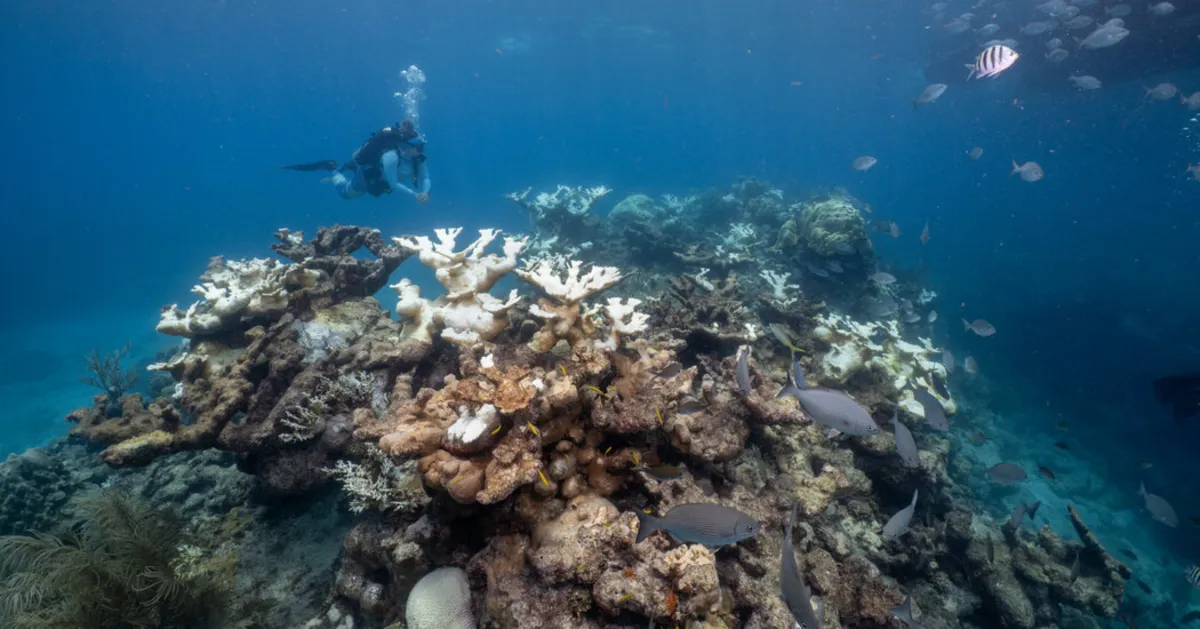
If global temperatures continue to rise, a recent study reveals that virtually all the corals in the Atlantic Ocean may cease to grow and could face severe erosion by the end of the century. The comprehensive analysis of over 400 existing coral reefs across the Atlantic indicates that more than 70% of the region’s reefs could start dying by 2040, even under optimistic climate warming scenarios. Alarmingly, if the planet's temperature surpasses 2 degrees Celsius above preindustrial levels by the century's end, a staggering 99% of corals in the region would be at risk.
As of now, the planet has warmed approximately 1.3 degrees Celsius compared to preindustrial temperatures. The implications of this warming are dire. Corals serve as essential building blocks of marine ecosystems, providing crucial habitats for thousands of fish species and other marine organisms. Furthermore, they act as natural barriers that mitigate wave action and protect coastlines from the devastating impacts of rising sea levels. According to the National Oceanic and Atmospheric Administration, a quarter of all ocean life depends on coral reefs, and over a billion people worldwide benefit directly from these vital ecosystems.
To predict the future of corals under changing environmental conditions, scientists examined corals that flourished over 10,000 years ago throughout the Caribbean, including key locations such as the Florida Keys, Barbados, and Costa Rica. Many of these ancient coral remnants are now located on islands where tectonic activity has uplifted and exposed the seabed, providing invaluable data that cannot be obtained from living corals without causing harm. “The reefs have changed so much that they’re not even slightly doing what the reefs of the past used to do,” stated Alice Webb, a coral reef ecologist at the University of Exeter and one of the study’s authors, published in the journal Nature.
For millennia, corals have adapted by growing vertically to keep pace with rising sea levels, maintaining a close relationship between reef height and sea levels. However, the current rate of climate change is too rapid for corals to adapt effectively, breaking this crucial relationship. Chris Perry, a coral reef geoscientist at the University of Exeter and the lead author of the study, emphasizes that the link between reef growth and rising sea levels “is essentially broken.”
Corals in the Caribbean have faced significant challenges in recent years, suffering from extreme heat stress and disease outbreaks, which are worsened by rising temperatures. The study found that approximately 60% of the reefs near Florida and nearly 40% of those near Mexico have essentially stopped growing. “We’ve seen off-the-scale warming, the magnitude and longevity of which has never been seen in the region,” Dr. Perry noted.
The world appears to be heading towards a critical warming threshold that could jeopardize coral ecosystems. The latest report from the Intergovernmental Panel on Climate Change indicates that limiting global warming to 2 degrees Celsius requires an unprecedented increase in efforts to reduce greenhouse gas emissions. Corals are living organisms that rely on microscopic algae for color and sustenance. When water temperatures rise excessively, these essential microorganisms are expelled, leading to coral bleaching. Prolonged exposure to elevated temperatures can result in widespread coral mortality.
Oceans absorb a significant portion of the carbon dioxide emitted from human activities, which leads to ocean acidification. This process depletes the compounds that corals need to build their calcium carbonate skeletons, further jeopardizing their survival. The study's authors caution that while concentrated efforts to restore coral reefs could help buffer against rising sea levels, widespread success remains unlikely as long as the planet continues to warm. Restoration efforts pose numerous challenges, particularly because corals are generally slow-growing organisms. It can take centuries for a reef to accumulate enough biomass to effectively protect coastlines.
Two species of corals known for their rapid growth and branching abilities are particularly vulnerable to heat stress and have been declining in recent decades. “We can’t assume that if we restore the corals of the past they will be able to cope with the conditions of the future,” cautioned Andrew Baker, a marine ecologist at the University of Miami, who was not involved in the study. The future of Atlantic coral reefs remains uncertain, highlighting the urgent need for global action to combat climate change and protect these vital ecosystems.